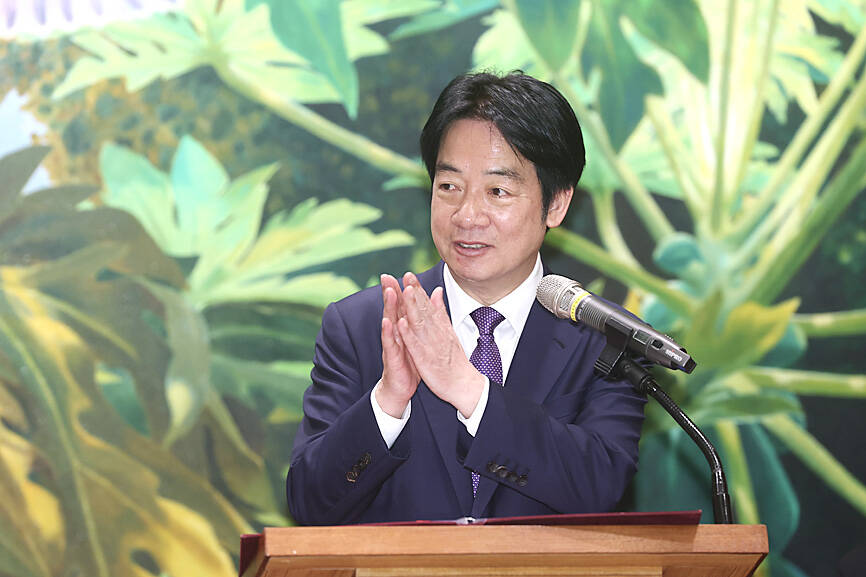US President Donald Trump’s tariff and trade policies announced earlier this month would significantly affect global supply chains, although Taiwan would use the opportunity to bolster bilateral trade relations and economic cooperation, President William Lai (賴清德) said yesterday during a meeting with the Taiwanese Chambers of Commerce North America at the Presidential Office.
Lai praised the organization for playing a vital role in bridging the gap between Taiwanese businesses and markets across the Pacific, improving US-Taiwan economic relations and deepening interpersonal relationships.
The chambers have sent a delegation to Taiwan every year since their establishment in 1988.

Photo: CNA
The organization sent a group to Washington to lobby top US Congress members on five major policies related to Taiwanese trade, economics and national defense, Lai said.
He thanked the organization for its efforts, which were largely supported by members of the US Congress.
In the face of a rapidly shifting global landscape, Taiwan needs even more support from the chambers to speak up for Taiwanese interests, he said.
In light of Trump’s plans to impose a 32 percent tariff on Taiwanese goods, the government has established a task force to enter negotiations with Washington, Lai said.
The government also plans to provide a support package of 20 measures across nine focus areas to protect the interests of Taiwanese industries and prop up domestic businesses that would be most affected by the tariffs, he said.
Lai said he hopes that overseas Taiwanese businesses can provide advice and assistance in leveraging new global supply chains and enhancing Taiwan-US cooperation, he added.
Lai said he and Premier Cho Jung-tai (卓榮泰) have spent the past two weeks touring businesses around Taiwan to hear the opinions of industry leaders and ensure that government policies can offer support where it is most needed.
Negotiations are under way and progressing smoothly between Taiwan and the US regarding tariffs, Minister of Foreign Affairs Lin Chia-lung (林佳龍) said yesterday morning in an interview before reporting to the Legislative Yuan’s Foreign Affairs and National Defense Committee.
The Taipei Economic and Cultural Representative Office, Taiwan’s de facto embassy in the US, has established communication channels with the US Department of State and the US trade representative, while officials, including Representative to the US Alexander Yui (俞大?) are engaging in intensive discussions, he said.
Points of negotiation include tariffs, non-tariff trade barriers and issues related to investment, procurement and export controls, he added.
The government would also monitor negotiations between the US and Japan and other countries that have been subject to the new tariffs to inform its discussions with the US, he said.
In related news, Wyoming Governor Mark Gordon is leading a trade delegation to Taiwan, which arrived on Saturday and is to depart today.
The Wyoming Energy Authority is to sign a memorandum of understanding with the Taiwan Association of Quantum Computing and Information Technology to initiate bilateral cooperation in quantum technology development.
The delegation would also engage in discussions on Taiwan-US trade, particularly as it relates to projects and exchanges with Wyoming, Lin said.
Additional reporting by Huang Ching-hsuan

The Ministry of Economic Affairs has fined Taobao NT$1.2 million (US$36,912) for advertisements that exceed its approved business scope, requiring the Chinese e-commerce platform to make corrections in the first half of this year or its license may be revoked. Lawmakers have called for stricter enforcement of Chinese e-commerce platforms and measures to prevent China from laundering its goods through Taiwan in response to US President Donald Trump’s heavy tariffs on China. The Legislative Yuan’s Finance Committee met today to discuss policies to prevent China from dumping goods in Taiwan, inviting government agencies to report. Democratic Progressive Party Legislator Kuo Kuo-wen (郭國文) said

The Ministry of Economic Affairs has fined Taobao NT$1.2 million (US$36,900) for advertisements that exceeded its approved business scope and ordered the Chinese e-commerce platform to make corrections in the first half of this year or its license would be revoked. Lawmakers have called for stricter supervision of Chinese e-commerce platforms and more stringent measures to prevent China from laundering its goods through Taiwan as US President Donald Trump’s administration cracks down on origin laundering. The legislature’s Finance Committee yesterday met to discuss policies to prevent China from dumping goods in Taiwan, inviting government agencies to report on the matter. Democratic Progressive Party

Taiwan and its Pacific ally Tuvalu on Tuesday signed two accords aimed at facilitating bilateral cooperation on labor affairs, according to Taiwan’s Ministry of Foreign Affairs (MOFA). The governments inked two agreements in Taipei, witnessed by Foreign Minister Lin Chia-lung (林佳龍) and visiting Deputy Tuvaluan Prime Minister Panapasi Nelesone, MOFA said in a news release. According to MOFA, the agreements will facilitate cooperation on labor issues and allow the two sides to mutually recognize seafarers’ certificates and related training. Taiwan would also continue to collaborate with Tuvalu across various fields to promote economic prosperity as well as the well-being of their

Sung Chien-liang (宋建樑), who led efforts to recall Democratic Progressive Party (DPP) Legislator Lee Kun-cheng (李坤城), was released on bail of NT$80,000 today amid outcry over his decision to wear a Nazi armband to questioning the night before. Sung arrived at the New Taipei District Prosecutors’ Office for questioning in a recall petition forgery case last night wearing a red armband bearing a swastika, carrying a copy of Adolf Hitler’s Mein Kampf and giving a Nazi salute. Sung left the building at 1:15am without the armband and covering the book with his coat. Lee said today that this is a serious